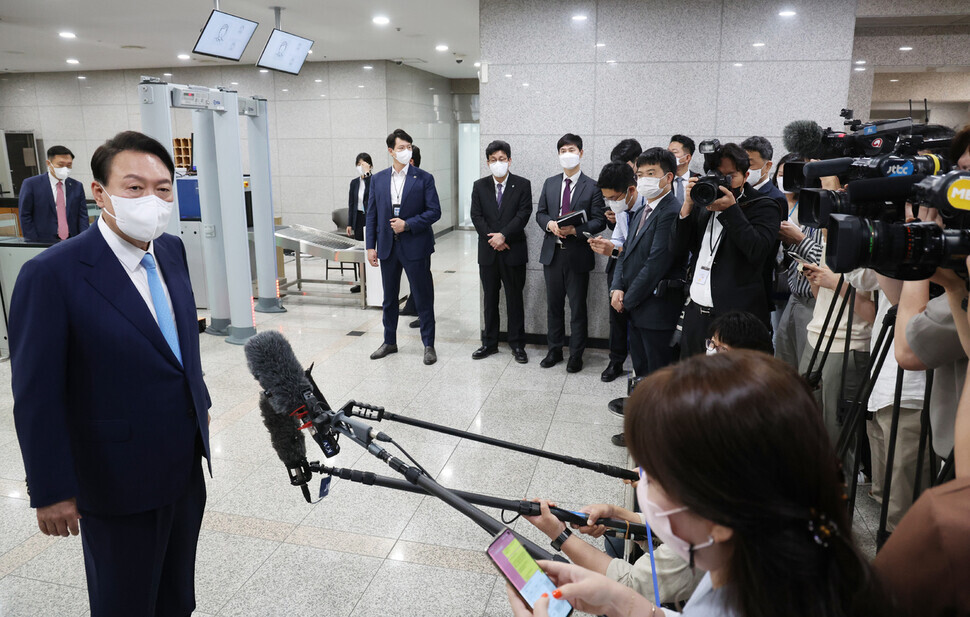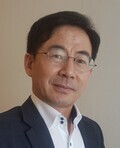hankyoreh
Links to other country sites 다른 나라 사이트 링크
[Column] Yoon’s “Y-nomics” is coming, and it’s going to be brutal


The term “Y-nomics” has been adopted to refer to the economic policies of the recently inaugurated administration of South Korean President Yoon Suk-yeol. But what exactly does it entail?
Some clues toward understanding it could be found in Yoon’s inaugural address on May 10. The core ideas were packed into the following three lines of his speech.
“Human history shows that when political and economic freedom reigns supreme, that is where prosperity and abundance flourished.”
“I do not believe we can overcome this problem [of division and social conflict] without first achieving rapid and sustainable growth.”
“It is critical that we achieve rapid growth, and this will only be possible through science, technology and innovation.”
The key phrases here are “free market,” “rapid growth,” and “science and technology.” There’s nothing new about that. It’s the same philosophy that was articulated in the economic policies of the Lee Myung-bak administration (2008–2013).
The entry for “MB-nomics” — MB standing for “Myung-bak” — found in Maeil Business’s dictionary of economic terminology reads as follows: “The objective [of MB-nomics] is to allow for a natural market-based resolution of issues in the South Korean economy such as low growth and polarization by minimizing government regulations and lowering taxes, leaving matters up to the market so that economic actors can compete and show creativity within the market.”
It wasn’t tough to predict what sorts of policies would emerge at the forefront of “Y-nomics”: tax breaks such as corporate tax reductions for chaebol corporations, along with the elimination or easing of regulations that burden company owners. Indeed, Deputy Prime Minister and Minister of Economy and Finance Choo Kyung-ho firmly pledged to remove regulations and reduce corporate taxes and company inheritance taxes at his first meeting with business group leaders on June 2.
Lowering corporate taxes is an approach that we may well consider. But if the example of the Lee administration is anything to go by, it’s questionable how far that will go in achieving the goal of stoking investment. The decline in tax revenue from the lower corporate taxes will end up being filled with higher income taxes on workers and self-employed small business operators.
When regulations are unnecessary and excessive — a matter of government officials throwing their weight around — it’s right to eliminate or ease them.
But we can’t just eliminate regulations willy-nilly when they exist to protect the lives and health of workers, to ensure fair negotiations and transactions between the economically powerful and vulnerable, or to realize societal values such as preserving the environment and achieving balanced development. Instead, we should be checking to see whether they are working efficiently.
It’s been a month since the Yoon administration took office. The new administration will be announcing the direction of its economic policies in short order, and we can predict the gist of that direction from the way it has carried itself since the forming of its transition committee shortly after the presidential election on March 9.
Prices are the single most pressing economic issue at the moment. Yoon has underscored consumer prices on multiple occasions. He also said Tuesday that he planned to take “every measure available to the government on the supply side.”
He does seem to be giving the matter a great deal of attention. But when prices are soaring because of some supply upheaval, it takes more to solve the problem than just promises to “rein them in.”
When prices spiked during the Lee administration, it responded by selecting 52 daily essential items for “focused management.” This ended up being derided by critics who claimed the “MB items” were driving up inflation.
On May 30, the Yoon administration announced measures for stabilizing prices for daily essentials and food, including exemptions of up to 25% of imported pork duties and the waiving of the value-added tax (10%) on coffee beans through next year. A month or two from now, we will see how little effect this will have had.
Indeed, the core component of the measures announced that day — two days before the local elections — was a holding tax reduction that is particularly beneficial to owners of expensive homes. The 90 million won in support for disadvantaged groups was just a bit of packaging. It was brutal.
When prices are rising rapidly, government policies should be rated according to how they respond to the suffering and conflicts experienced by economic actors. The pain has been relatively minor for corporations, which have the market dominance they need to simply reflect the rising raw material rises in their selling price. For some of them — including petroleum refining businesses — this has been a bonanza.
Instead, the pain falls disproportionately on the subcontracting businesses unable to demand higher prices for their items when their raw material prices rise, and on the workers unable to ask for higher wages when the cost of daily essentials goes up.
Adjusting things so that the pain is distributed fairly is more important than just “managing prices.” But there is no sign of the administration right now in the places where it ought to be.
The first thing that the administration should be doing is to introduce a sliding scale system for unit prices. This means helping to ensure that freight charges are fairly determined so that truck drivers don’t end up shouldering all the burden of rising oil prices, and that the minimum wage review process doesn’t lead to cuts in real wages.
President Yoon has reportedly ordered an examination of additional reductions to the oil tax, which has already been lowered to the flexible tax rate limit of 30%.
Another 10% reduction would put it around 82 won per liter for gasoline — which amounts to a handout of tax revenues with nothing to show for it. Wouldn’t it be better to use that money to support low earners whose real income has fallen?
At 62 trillion won, the second supplementary budget is the largest in South Korea’s history. But the budget for stabilizing prices and the livelihoods of Koreans amounts to just 2.2 trillion won of that.
Talk about brutal.
Please direct questions or comments to [english@hani.co.kr]

Editorial・opinion
![[Column] Season 2 of special prosecutor probe may be coming to Korea soon [Column] Season 2 of special prosecutor probe may be coming to Korea soon](https://flexible.img.hani.co.kr/flexible/normal/500/300/imgdb/original/2024/0426/3317141030699447.jpg) [Column] Season 2 of special prosecutor probe may be coming to Korea soon
[Column] Season 2 of special prosecutor probe may be coming to Korea soon![[Column] Park Geun-hye déjà vu in Yoon Suk-yeol [Column] Park Geun-hye déjà vu in Yoon Suk-yeol](https://flexible.img.hani.co.kr/flexible/normal/500/300/imgdb/original/2024/0424/651713945113788.jpg) [Column] Park Geun-hye déjà vu in Yoon Suk-yeol
[Column] Park Geun-hye déjà vu in Yoon Suk-yeol- [Editorial] New weight of N. Korea’s nuclear threats makes dialogue all the more urgent
- [Guest essay] The real reason Korea’s new right wants to dub Rhee a founding father
- [Column] ‘Choson’: Is it time we start referring to N. Korea in its own terms?
- [Editorial] Japan’s rewriting of history with Korea has gone too far
- [Column] The president’s questionable capacity for dialogue
- [Column] Are chaebol firms just pizza pies for families to divvy up as they please?
- [Column] Has Korea, too, crossed the Rubicon on China?
- [Correspondent’s column] In Japan’s alliance with US, echoes of its past alliances with UK
Most viewed articles
- 1After election rout, Yoon’s left with 3 choices for dealing with the opposition
- 2Two factors that’ll decide if Korea’s economy keeps on its upward trend
- 3Noting shared ‘values,’ Korea hints at passport-free travel with Japan
- 4AI is catching up with humans at a ‘shocking’ rate
- 5Why Kim Jong-un is scrapping the term ‘Day of the Sun’ and toning down fanfare for predecessors
- 6South Korea officially an aged society just 17 years after becoming aging society
- 7Korea’s 1.3% growth in Q1 signals ‘textbook’ return to growth, says government
- 8Value of Korean won down 7.3% in 2024, a steeper plunge than during 2008 crisis
- 9‘We must say no’: Seoul defense chief on Korean, USFK involvement in hypothetical Taiwan crisis
- 10Is Japan about to snatch control of Line messenger from Korea’s Naver?